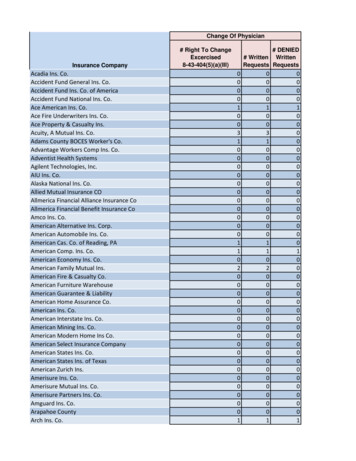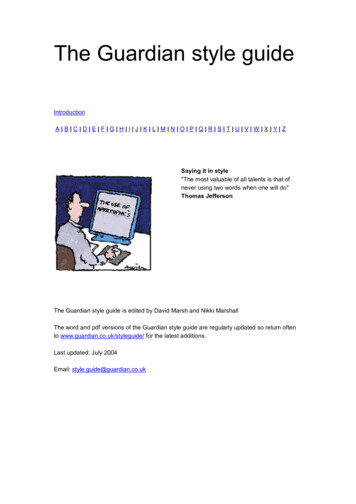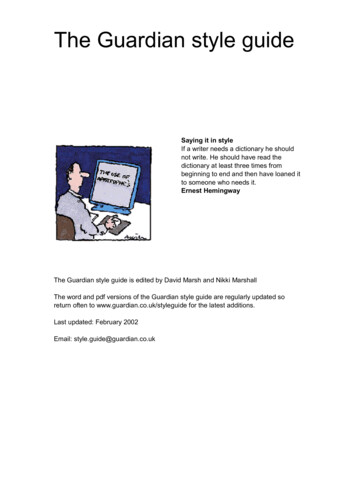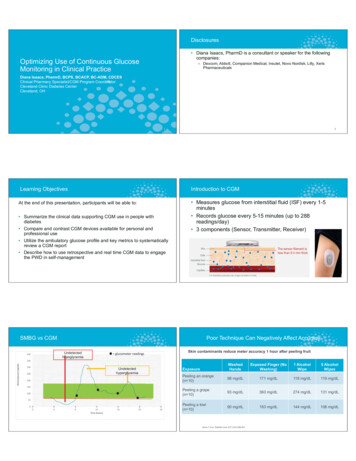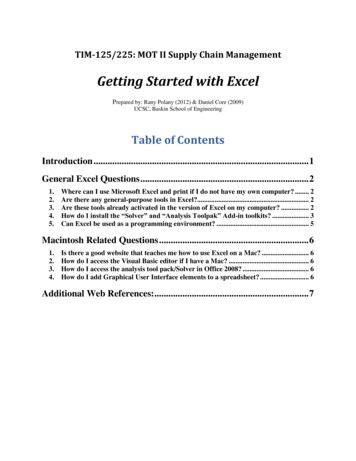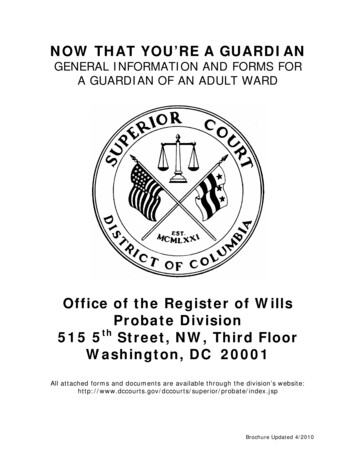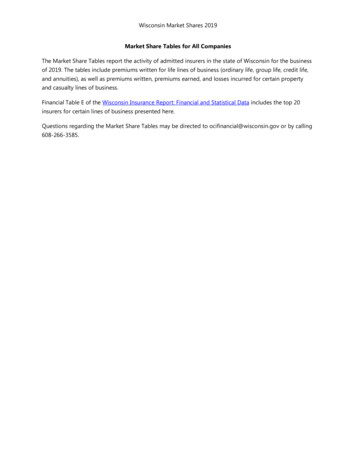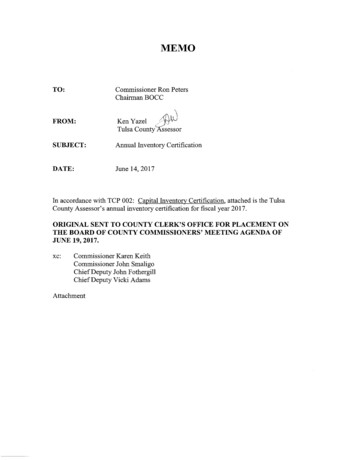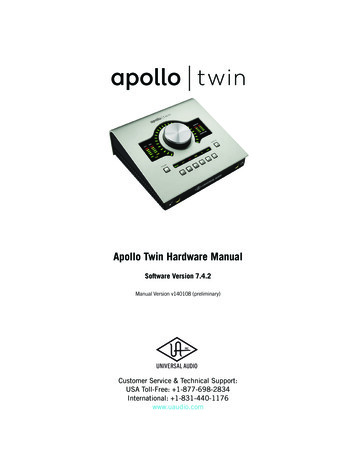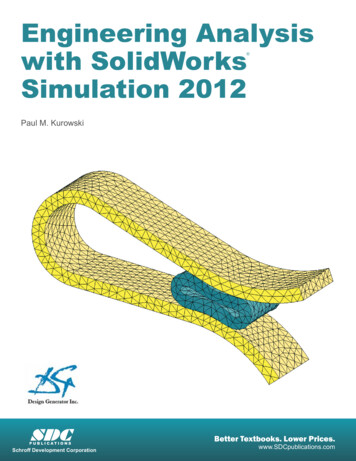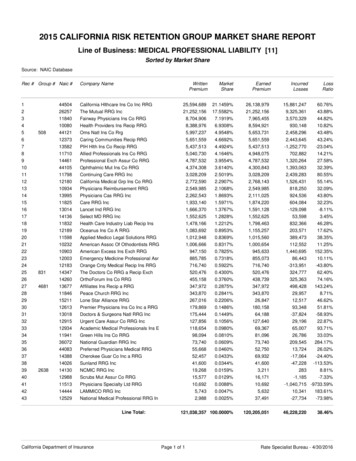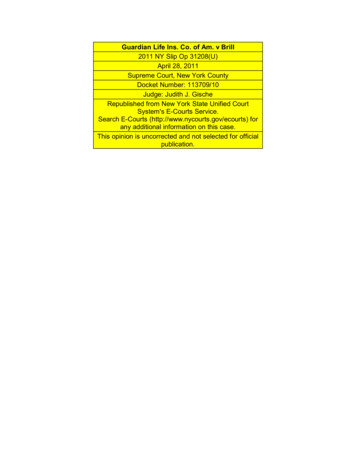
Transcription
Guardian Life Ins. Co. of Am. v Brill2011 NY Slip Op 31208(U)April 28, 2011Supreme Court, New York CountyDocket Number: 113709/10Judge: Judith J. GischeRepublished from New York State Unified CourtSystem's E-Courts Service.Search E-Courts (http://www.nycourts.gov/ecourts) forany additional information on this case.This opinion is uncorrected and not selected for officialpublication.
[* 1]NNED ON 5161201 1SUPREME COURT OF THE STATE OF NEW YORK - NEW YORK COUNTY/PRESENT:(J-3?\[(PART/0Justice1The following papers, numbered 1 toNotice of Motion/ Order t o Show CauseAnswering Affldavits-were read on this rnotlon tolfor- Affidavits -ExhibitsExhibitsReplying AffidavitsCross-Motion:flYes X N o.IPAPERS NUMBEREDUpon the foregoing papers, it is ordered that this motionILEDJ:heck one:J.S. C.NON-FINAL DISPOSITIONcj FINAL DISPOSITIONuCheck if appropriate:DO NOT POSTSUBMIT ORDER/ JUDG.r-irj REFERENCEri SETTLE ORDER/ JUDG.
[* 2]NEWYORKNEWYORK: IAS PARTI OS U P R E M E C O U R T OF T H E STATE OFC O U N T Y OF X DECISION/ORDERTHE GUARDIAN LIFE INSURANCE COMPANYIndex No.: I 1 370911 0OF AMERICA and PARK AVENUE SECURITIESLLC.,Seq. No.:001Plaintiffs,PRESENT:Hon. Judith J. GischeJ.S.C.-against-MITCHELL BRILL, ANTHONY DESTEFANO,JAMES GIANGRANDE, JAMES DOWLING,ALTIUM PLANNING LLC, and ALTIUMWEALTH MANAGEMENT LLC,FILEDMAY 08 2011DefendantsPapersNumbered1Pltfs’ OSC (56301) wlJA affid, exhs . . . . . . . . . . . . . . . . . . . . . . . . . . . . . . . .Summons & Complaint . . . . . . . . . . . . . . . . . . . . . . . . . . . . . . . . . . . . . . . . . .2Defs’ opp w/JRH affirm . . . . . . . . . . . . . . . . . . . . . . . . . . . . . . . . . . . . . . . . .3Pltfs’ reply w/ JA affid . . . . . . . . . . . . . . . . . . . . . . . . . . . . . . . . . . . . . . . . . . .4Defs’ further opp w/JRH declaration, JA, AD, JD, MB, JG affids, exhs . . . . . 5Upon the foregoing papers, the decision and order of the court is as follows:Plaintiff, Guardian Life Insurance Company of America (“Guardian”), is a mutuallife insurance company, and Park Avenue Securties LLC. (“PAS”) is one if itss ubs idi a ries . Defenda nt s , M itche II BriII (“ B riII”) , Anthony DeSt ef a n0 ” ), James(I‘Giang ra nde (“ Gia ng rande”), James Dow Iing (“ Dow Iing”) (co IIect iveIy , t he ind iv id ua Idefendants”) are former independent contractors of plaintiffs, who plaintiffs allegebreached their duties by, among other things, misappropriating client information.-Page 1 of 14-
[* 3]Defendants Altium Planning LLC (“Altium Planning”) and Altium Wealth ManagementLLC (”Altium Wealth”), are companies established by the individual defendants.Plaintiff commenced this action by filing and serving the summons andcomplaint, together with this order to show cause which seeks a preliminary injunctionagainst defendants: ( I ) from disclosing, reproducing, transferring or using anyconfidential, proprietary, or trade secret information belonging to plaintiffs; (2) to returnto plaintiffs all such information; (3) to provide sworn statements and accountings of allfiles, data, and information unlawfully retained or removed, belonging to plaintiffs; and(4) from directly or indirectly soliciting any of plaintiffs’ clients that are identified inplaintiffs’ confidential information.Pending its decision on this motion, the court enjoined all defendants fromdisclosing any confidential or proprietary information andlor trade secrets of theplaintiffs. Order, Gische J., 10/19/10.The court’s decision is as follows:ArgumentsGuardian provides life insurance, disability income insurance, retirementservices, employee benefits, and investments. It independently contracts withindividual “field representatives” to solicit clients, sell Guardian’s financial products, andservice Guardian’s clients. PAS is a broker-dealer firm with “registered representatives”who are qualified to service PAS’S clients with investment advice and to provide wealthand asset management solutions to individuals and corporate clients. Many of PAS’S-Page 2 of 14-
[* 4]clients are referred from Guardian. Guardian developed and used a software programknown as a Living Balance Sheet (sometimes “LBS”),to accumulate detailedinformation relating to its clients. The Living Balance Sheet was designed to be usedby Field Representatives and Registered Representatives to better assist Guardian andPAS customers.Each of the individual defendants were both Guardian field representatives andPAS registered representatives and were authorized to sell and provide financialservices for both companies. It is undisputed that the individual defendants eachsigned a Field Representative Agreement with Guardian and RegisteredRepresentative Agreement with PAS, and that Brill and Dowling additionally signed aFinancial Advisor Agreement with PAS (collectively, the “Agreements”). Brill andDeStefano’s Agreements terminated on October I,2010 upon their resignations, andGiangrande and Dowling’s Agreements terminated on September 29, 201 0 upon theirresignations.The Field Representative Agreement with Guardian provides, in relevant part, asfollows:17. The Field Representative covenants and agrees thatafter termination of the Contract . . . the FieldRepresentative will not, directly or indirectly . . . advise,induce or attempt to induce any policyholder or annuitantof [Guardian] or any subsidiary . . . to lapse, cancel orreplace any insurance policy or annuity. . .Theseprohibitions shall last for a period of one (1) year followingthe termination of this Contract.The Registered Representative Agreement with PAS provides, in relevant part,as follows:-Page 3 of 14-
[* 5]49. Upon termination of this Agreement, you agree toreturn immediately to PAS’ home office all funds, property,books and records and supplies of every kind belonging toPAS, including but not limited to, client lists . . . client files. . . client agreements and new account documents. . .52. . . . You agree to safeguard the confidentiality of theConfidential Information and will not disclose ConfidentialInformation to any third party, except as permitted underThe Gramm-Leach-Bliley Act and federal privacyregulations . . .The Financial Advisor Agreement with PAS, signed by Brill and Dowling only,provides, in relevant part, as follows:9. You agree and fully understand that all client files andrecords are the property of P A S . . . and may not be sold,transferred or communicated to any person other than theclient to whom such records pertain without prior writtenpermission of PAS. Upon termination of this Agreement,you agree to return to PAS all materials including, but notlimited to, prospect and client lists . . , client files . . .documents and all other written or audiovisual materials.14. During the term of this Agreement and for one yearfollowing the date of termination of this Agreement, you willnot, directly or indirectly, own, manage, operate, join. . . int h e . . . operation. , o f . . . any business. . . which provides. . . investment advice to any Client of PAS , , ,In support of its motion for a preliminary injunction against defendants, plaintiffscontend that the individual defendants had incorporated Altium on June 25, 201 0, whilethey were still bound by the Agreements with Guardian and PAS, and without obtainingpermission to engage in outside business activity. Plaintiffs further contend that theindividual defendants were servicing their Altium clients through “eMoney,” which theyidentify as a less sophisticated version of LBS. Plaintiffs allege that the individual-Page 4 of 14-
[* 6]defendants transferred data for 319 of its clients from LBS to eMoney, thereby violatingthe confidentiality provisions contained in their Agreements. According to plaintiffs,defendants are using this information to steal plaintiffs’ clients. Plaintiffs argue that theissuance of a preliminary injunction is necessary to prevent immediate and irreparableharm to its business and business relationships.In opposition, the individual defendants contend that they were all independentcontractors and that the Agreements did not prohibit defendants from soliciting orcompeting against plaintiffs following the termination of the Agreements. Defendantsargue that they lawfully own and possess the clients’ information at issue because, interalia, the clients are defendants’ own personal contacts, family members, and friends,and the defendants were the ones to provide these clients with investment advice.Defendants also contend that they received approval for outside business activityin 2000 when they received permission to collect financial and personal data of clientsthrough a program called “Your Personal Financial Officer” (“Your PFO”). Defendantsargue that obtaining permission to collect data through “Your PFO” put all clients onnotice that their confidential data was being collected by defendants and not byplaintiffs. Defendants state that the “Your PFO” questionnaire was then used to providealmost all of the data now at issue on the Living Balance Sheet. Defendants state thatin 2010, Dowling further received approval for an outside business activity thatpermitted him to aggregate client data on the eMoney system. Defendants do notdispute that, thereafter, they took information from Living Balance Sheet, regarding the319 clients at issue, and moved this data to the eMoney system.Thus, defendants argue that the plaintiffs do not show a likelihood of success on-Page 5 of 14-
[* 7]the merits, and that the preliminary injunction must be denied.DiscussionOn a motion for a preliminary injunction, the movants (here the plaintiffs) mustdemonstrate a probability of success on the merits, danger of irreparable injury in theabsence of an injunction and a balance of equities in its favor (see CPLR9 6301; NobuNext Door, LLC v. Fine A@ Housinq, Inc., 4 N.Y.3d 839 [2005]; Aetna Insurance Co.,Inc. v. Capasso, 75 N.Y.2d 860 [1990]; W.T. Grant Co. v. Sroqi, 52 NY2d 496 [1981]).Although the party seeking a preliminary injunction does not have to provide conclusiveproof of its right to such relief, and a preliminary injunction can, in the court’s discretion,even be issued where there are disputed facts (Terrell v. Terrell, 279 A.D.2d 301 [IstDept. 2001]), a showing of likelihood of success is a bona fide requirement that must bemet before a preliminary injunction will lie. Post v. Killian, 73 A.D.3d 507 (1st Dept.2010); Famo, Inc. v. Green 521 Fifth Ave., LLC, 51 A.D.3d 578 (1st Dept. 2008).Generally, a preliminary injunction will be denied unless the relief is necessitated andjustified from the undisputed facts. O’Hara v. Corporate Audit Co., 161 AD2d 309 (IstDept. 1990). The purpose of a preliminary injunction is to maintain the status quo so asto insure that a victory is not worthless. See Mov v. Umeki,IO A.D.3d 604 (2d Dept.2004).In this context, “irreparable injury” means a continuing harm resulting insubstantial prejudice caused by the acts sought to be restrained if permitted to continuependente lite, and if granted, tailored to fit the circumstances so as to preserve the-Page 6 of 14-
[* 8]status quo to the extent possible (generally, Second on Second Cafe!, Inc. v. Hinq SingTradinq, Inc., 66 AD3d 255 [ I s t Dept 20091).As more fully set forth below, a preliminary injunction is available only againstBrill and Dowling to a limited extent. On the bulk of the claims, plaintiffs are unable toestablish a likelihood of success on the merits. Plaintiffs have asserted 9 causes ofaction for: specific performance and injunctive relief (COAI); breach of contract(COA2); misappropriation of trade secrets (COA3); breach of fiduciary duty of loyalty(COA4); unfair competition (COA5); conversion (COA6); unjust enrichment (COA7);breach of good faith and fair dealing (COA8); and to recover possession of chattelwrongfully taken (COA9).It is undisputed that defendants originally collected client data through “YourPFO,” which was their own software program. Much of that information was then usedto compile plaintiffs’ database, Living Balance Sheet, where it was stored on plaintiffs’platform. Defendants eventually took back the client information, claiming that it wasseparately collected by them to begin with. Plaintiffs’ response, that defendants had nopersonal right to this information, is belied by the fact that the information was alreadybeing used by defendants, with plaintiffs’ knowledge and/or consent, for approvedoutside business activity. It is undisputed that defendants provided custodial andadvisory services to clients outside of their duties for plaintiffs, as evidenced by theoutside business activity forms. The outside business activity forms, approved byplaintiffs, allowed defendants to service clients listed on the Living Balance Sheet forservices and products other than plaintiffs’ insurance products.The limited clause found in Paragraph 17 of the Field Representative Agreement-Page 7 of 14-
[* 9]with Guardian (supra),says that defendants will not induce any policyholder to lapse,cancel, or replace any insurance policy or annuity. Plaintiffs have made no showing onthis motion that there was any solicitation by defendants that caused Guardian’spolicyholders to lapse, cancel, or replace their insurance policies or annuities.To the extent plaintiffs argue that Paragraph 51 of the Registered RepresentativeAgreement with PAS prohibited defendants from solicitation, the court rejects thisargument as well. Plaintiffs acknowledge that Paragraph 51 was crossed out inDowling and Brill’s Agreements. Defendants have provided a signed copy ofGiangrande’s Agreement, which also has Paragraph 51 crossed out. To the extent thatdefendants do not have DeStefano’s Agreement, it would just as likely be in plaintiffs’possession. Plaintiffs have the burden on this motion of providing a copy of the signedagreement containing a non-solicitation clause; because they did not do so, there is noshowing that DeStefano signed a non-solicit clause. Accordingly, the court finds thatthe Registered Representative Agreement imposes no restrictions on defendants’ rightto solicit clients.Paragraph 52 of the Registered Representative Agreement with PAS alsocontains no prohibition against defendants soliciting plaintiffs’ former clients. To theextent it requires defendants to protect client confidentiality, it is in consonance with andspecifically references the Federal Gramm-Leach-Bliley Act. The Gramm-Leach-Blileyto insure theAct was enacted to provide procedures for financial institutions “(I)security and confidentiality of consumer records and information; (2) to protect anyanticipated threats or hazards to the security or integrity of such records; and (3) toprotect against unauthorized access to or use of such records or information which-Page 8 of 14-
[* 10]could result in substantial harm or inconvenience to any customer.” 15 U.S.C. § 6801(b). The Gramm-Leach-Bliley Act, therefore, requires a financial institution to give itscustomers notice and an opportunity to opt out of disclosure before releasing anycustomer’s “nonpublic personal information to a non-affiliated third-party.” 15 U.S.C. 56802; Alpha Fundinq Group v. Continental Fundinq, LLC, 17 Misc.3d 959 (N.Y.Sup.2007).Here, defendants are not classified as non-affiliated third-parties to the 31 9clients at issue. In fact, defendants state that the 319 clients are friends, familymembers, neighbors, and defendants’ own personal contacts. Defendants personallymet with these clients and were the ones to initially upload the clients’ information todefendants’ own database.Even if the court accepted plaintiffs’ argument that Paragraph 52 of theRegistered Representative Agreements restricts the use of plaintiffs’ trade secrets orproprietary information, plaintiffs have failed to show that the client information it seeksto now protect was a trade secret.A trade secret is “any formula, pattern, device or compilation of information whichis used in one’s business, and which gives him an opportunity to obtain an advantageover competitors who do not know or use it.” Restatement of Torts5 757, comment b.The Restatement suggests that in deciding a trade secret claim, several factors shouldbe considered: “(1) the extent to which the information is known outside of [the]business; (2) t h e extent to which it is known by employees and others involved in [the]business; (3) the extent of measures taken by [the business] to guard the secrecy of theinformation; (4) the value of the information to [the business] and [its] competitors; (5)-Page 9 of 14-
[* 11]the amount of effort or money expended by [the business] in developing theinformation; (6) the ease or difficulty with which the information could be properlyacquired or duplicated by others” (Restatement of Torts § 757, comment b). AshlandManaqement Inc. v. Janien, 82 N.Y.2d 395 (1993). As these considerationsdemonstrate, a trade secret must first of all be secret. Ashland Manaqement Inc. v.Janien, supra. Although plaintiffs assert that defendants utilized trade secrets byappropriating confidential customer lists, injunctive relief will not be given unless theclient information cannot be ascertained outside the plaintiffs’ business, are not knownin the trade, and are discoverable only by extraordinary efforts. Leo Silfen, Inc. v.Cream, 29 N.Y.2d 387 (1972); Metal & Salvaqe Ass’n, Inc. v. Sieqel, 121 A.D.2d 200( I st Dept. 1986).The client lists that plaintiffs seek to enjoin are not trade secrets under thisdefinition. Defendants initially gathered the data from the clients independently ofplaintiffs as part of outside business activity and defendants had relationships withthese clients independently of plaintiffs. See Metal & Salvage Ass‘n, Inc. v. Sieqel,supra.Paragraph 14 of the Financial Advisor Agreement with PAS, signed by Brill andDowling, provides that they shall not directly or indirectly own, manage, operate or joinin the operation of any business which provides investment advice to any client of PAS(supra).In BDO Seidman, the Court of Appeals held that there was a three prong test ofreasonableness that had to be satisfied before non-compete clauses in employmentcontracts were found to be enforceable. They are that the clause: [1] is no greater than-Page 10 of 14-
[* 12]what is required to protect the legitimate interest of the employer; [2] does not imposeundue hardship on the employee; and [3] is not injurious to the public. The first prong isoften assessed by whether t h e restrictive covenant is reasonable as to time and area.BDO Seidman v. Hirshberq, 93 N.Y.2d 382 (1999); Gelder Medical Group v. Webber,41 N.Y.2d 680 (1977); North Shore Hematoloqv/Oncoloqy v. Zevros, 278 A.D.2d 210(2d Dept. 2000); Zelner v. Conrad, 183 A.D.2d 250 (2d Dept. 1992).Here, the non-compete clause is limited to one year and has no geographicalradius. On its face, this is a reasonable amount of time, and defendants do not makean issue regarding the lack of geographical restriction. However, it cannot bedetermined, at this time, which of the 31 9 clients are specifically plaintiffs’ “clients” towhom the contractual provision applies. To the extent that the 319 clients at issue aredefendants’ personal clients who came to plaintiffs solely to avail themselves ofdefendants’ services and only as a result of defendants’ independent recruitmentefforts, this provision of t h e Agreement is unenforceable. BDO Seidman v. Hirshberg,supra at 393. Where the goodwill of those clients was not acquired through theexpenditure of plaintiffs’ resources, plaintiffs have no legitimate interest in preventingdefendants from competing for their patronage. BDO Seidman v. Hirshberq, supra at393.Accordingly, the Financial Advisor Agreement with PAS is enforceable, but onlyagainst Brill and Dowling, and only to the extent that they are preliminarily enjoined fromdirectly or indirectly owning, managing, operating or joining in the operation of anybusiness which provides investment advice to any client of PAS for one year from theirdate of termination (Brill from October 1 , 2010 and Dowling from September 29, 2010).-Page 11 of 14-
[* 13]The term ”client” shall include only those clients to whom Bril and Dowling did notprovide services and products outside of their work for plaintiffs.It also does not appear that the balance of equities tip in plaintiffs’ favor for thebroad-based relief they seek. Defendants have come forward with strong argumentsthat the information they are accused of misappropriating is not proprietary, but widelyavailable, or can be culled from, many sources. IVI Environmental, Inc. v. McGovern,supra. Additionally, defendants have shown that plaintiffs were aware of their outsidebusiness activities; it is undisputed that defendants’ originally obtained and uploadedthe client data at issue. The broad injunction plaintiffs seek would not only curtaildefendants’ outside business activities, which plaintiffs permitted while the defendantswere independent contractors, but would also restrict the clients from being serviced byfinancial advisors of their own choosing.Finally, to the extent plaintiffs seek an immediate accounting, it is deniedbecause it is not necessary to maintain the status quo if it is not otherwise a branch ofrelief requested in the complaint, and even were it properly plead, it would be anultimate relief not available as part of a preliminary injunction.Since plaintiffs have not made a threshold showing of likelihood of success onthe merits or that the equities balance in its favor, plaintiffs’ motion for a preliminaryinjunction is hereby denied against defendants DeStefano, Giangrande and Altium.The temporary restraining order granted by the court is hereby vacated forthwith.However, a limited preliminary injunction is granted against Brill and Dowling, as per theterms set forth in this decision/order.To the extent that plaintiffs seek to have its documents and files returned,-Page 12 of 14-
[* 14]defendants represented to the Court that they agree to do so. Accordingly, defendantsshall hereby return all documents and files in its possession over to plaintiffs, if theyhave not already done so.Although plaintiffs seek an expedited discovery schedule, it appears as though apreliminary conference has not yet been held. Accordingly, a preliminary conferenceis hereby scheduled for Thursday June 9, 2011 at 9:30 a.m. in Part I O , 60 CentreStreet, Room 232 so that discovery schedule can be set. No further notices will besent.ConclusionIn accordance herewith, it is hereby:ORDERED that plaintiffs’ motion for a preliminary injunction is GRANTED only tothe extent that defendants, MITCHELL BRILL and JAMES DOWLING, are herebyenjoined for a period of one year from their respective resignations from directly orindirectly owning, managing, operating, or joining in the operation of any business whichprovides investment advice to any client of PAS; and it is furtherORDERED that within 30 days of entry of this order, defendants shall return alldocuments and files in its possession over to plaintiffs, if they have not already done so;and it is furtherORDERED that this motion is otherwise denied; and it is furtherORDERED that a preliminary conference is hereby scheduled for Thursday-Page 13 of 14-
[* 15]June 9, 2011 at 9:30 a,m. in Part I O , 60 Centre Street, Room 232. No further noticeswill be sent; and it is furtherORDERED that any relief requested that has not been addressed hasnonetheless been considered and is hereby expressly denied; and it is furtherORDERED that this constitutes the decision and order of the court.Dated:New York, New YorkApril 28, 201 ISo Ordered:-Page 14 of 14-
Plaintiff, Guardian Life Insurance Company of America (“Guardian”), is a mutual life insurance company, and Park Avenue Securties LLC. (“PAS”) is one if its s u b s id i a r i e s . Defend a n t s , M itch e I B
